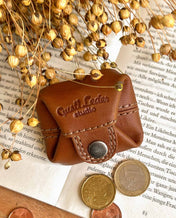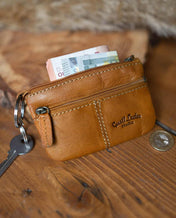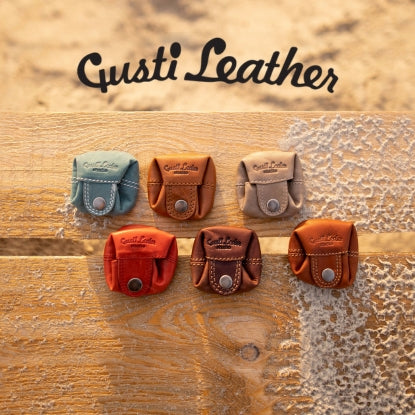
About Gusti Leather Our Story - Our Passion
Inspired by a Journey – Created for the World
Gusti Leather was born from an idea that originated during travels. Our founder Christian Pietsch wanted not only to create beautiful and practical products but also to make a positive difference – for the people who make our products and for the environment that belongs to us all.
Today, we stand for handcrafted leather bags and accessories that are not only timelessly beautiful but also sustainable. Our designs combine tradition and modernity and tell stories from around the world.
Our claim: Durable quality, thoughtful designs, and close collaboration with our producers. Each product tells its own story and impresses with exquisite design, elegant colors, and high functionality. With our passion for leather, we create products that never go out of style – for people who appreciate the extraordinary.
-
Our Mission
Create fascinating and innovative leather products that make you look styled and keep you always on trend."
-
Our Vision
"We strive to become a highly productive and effective organisation by promoting fairness and transparency in the workplace."
Our Goals
A significant portion of our revenue currently comes from products that have been tanned using chrome. However, we are aware that this type of tanning can have negative impacts on the environment. Therefore, we have set ourselves the goal of increasingly sourcing leather that has been tanned naturally and in an environmentally friendly way in the future. It is important to us to contribute to a more sustainable future and to increasingly rely on vegetable-tanned leather, which is more resource-efficient and better for the environment.
Our second major goal is to reduce our dependence on conventional online marketing strategies and to increasingly rely on alternative ways of reaching customers. Instead, we aim to be more present in various city centers. A great way to strengthen our presence in different locations is to open pop-up stores. These temporary shops allow us to increase awareness of our brand and reach more and more customers who love leather and make it their reliable companions. By establishing ourselves more in city centers, we want to create unique shopping experiences and spread our philosophy of sustainable leather widely.
Our Values
-
Adaptability
Adapt to changes and respond quickly
-
Organization
Maintain ethical behavior in the workplace, show punctuality, and meet commitments on time
-
Communication
Promote teamwork and collaboration through clear communication
-
Reliability
Maintain integrity in our professional actions
-
Improvement
Promote professional growth of employees through knowledge sharing and collaboration in the workplace
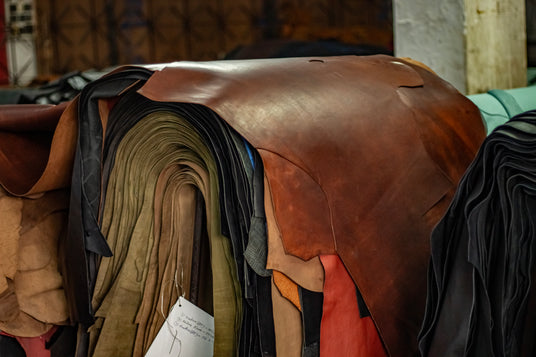
Philosophy in Practice
Gusti Leather stands for transparent production and responsible handling of materials - always in harmony with people and nature.
Leather - We exclusively use leather from animals that are primarily kept for meat production and breeding. The hides are a by-product that we process into high-quality leather goods to use resources sensibly.
Transparency - Sustainability, environmental protection, animal welfare, and fair working conditions are essential values for us. We actively advocate for ethical and environmentally conscious production.
Discover our product lines
-
Gusti Leder Nature
Our first brand was Gusti Leder Nature. Our collection of bags in this category consists mainly of vegetable-tanned goat leather.
-
Gusti Leder Studio
The company's second product line is Gusti Leder Studio. The unique products consist mainly of buffalo and cowhide leather and are tanned using the chrome tanning process.
Gusti Leder – Online & on-site for you
Our products are available through all major online and offline channels. Through our e-commerce platforms, we offer our range directly to end customers in Europe, the UK, the USA, and many other countries worldwide.
Visit us in our stores in Germany, Austria, and the Netherlands to experience our leather products up close. In addition to shopping, you can look forward to our DIY corner, where you can implement creative projects with leather pieces - design handmade unique items like keychains or small bags according to your wishes.
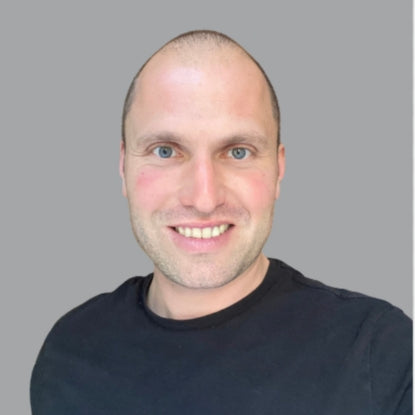
Christian Pietsch
CEO, Gusti Leder
You founded Gusti Leather about 14 years ago. What are you particularly proud of?
You founded Gusti Leather about 14 years ago. What are you particularly proud of?
I am proud of the team because they have managed to tackle many different topics and improve our products. And yes! That is especially important for our customers.
You visit India very often. Why do you do that?
You visit India very often. Why do you do that?
Because it is important to get a personal impression of the situation, both with our manufacturers and with our team, to meet in person.
So, your manufacturers are in India?
So, your manufacturers are in India?
Yes, in India, as well as in Italy, and we have recently added some producers in Pakistan.
How important is sustainability to you at Gusti?
How important is sustainability to you at Gusti?
Sustainability is very important to me. But it is a big word. I think it should be broken down into small actions. So, what exactly have I done this month, this quarter, this year to make our company more sustainable? It's not just about being labeled sustainable or not. It's more about what you have done this quarter to make it more sustainable.
What is your position on sustainability and what have you implemented at Gusti so far?
What is your position on sustainability and what have you implemented at Gusti so far?
I think sustainability is a big topic. For example, I believe that we shouldn't have a sustainability manager. Instead, every team leader should think about what they can do to improve sustainability. In every area, we are simultaneously working on many different things.
Can you name at least one thing?
Can you name at least one thing?
I would say 60-70% of our sales currently come from articles that are tanned with chrome. That harms Environment, and therefore our goal for Gusti is to have chrome -free leather in the future. Although we are already 40% vegetable have tanned leather, we want to be completely chrome -free in 2024
What are your short-term goals for this year?
What are your short-term goals for this year?
Currently, we are also working on many small projects. For example, we have reduced the plastic content in our articles and eliminated plastic bags altogether. Instead, they are now shipped as paper bags. But then we learned that even paper is not sustainable. So, the best option is to receive them as pure leather without packaging. Now we are trying to coordinate this with our distribution channels.
What do you want to achieve in the next few years?
What do you want to achieve in the next few years?
I want to make Gusti less dependent on online marketing. For us, for me, it is very unsustainable to pay Google or Facebook for advertising, even though we currently have to. So I want to be more present in the city center.
Do you specifically slaughter animals for your leather, or are they materials already in use on the market? And do you have these raw materials?
Do you specifically slaughter animals for your leather, or are they materials already in use on the market? And do you have these raw materials?
No animal was killed for our leather. Not specifically for our leather. You can see that in our prices. When a company sells a handbag made of crocodile leather, such bags cost 500-600 euros because the animal was killed for its skin. We, on the other hand, use the waste from the meat industry. When we receive this waste, it allows us to offer affordable and sustainable products since leather, as a byproduct of the meat industry, can be considered sustainable.
What has been achieved so far at Gusti?
What has been achieved so far at Gusti?
I would say that the greatest we have achieved is the specialization in a niche. We really started fashion items such as backpacks and found our niche. And I am really proud of that that we have gotten into bicycle products so intensely, which I think I never officially said. But three years ago I had a pretty difficult time and found motivation in bicycles. To be successful with our bicycle items is really, yes, if you ask me, one of our great success.
What do you love most Gusti Leather generally?
What do you love most Gusti Leather generally?
I think there is not only one Gusti Lether. It has different facets. We all have our shops in which our managers and team members work every day and do their best to improve, tinker and sell. Then there are other parts of the company, for example on the logistics page, where it is about improving processes so that we can send our articles faster. We try to answer our emails faster and to repair as many items as possible in another area.


